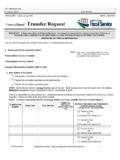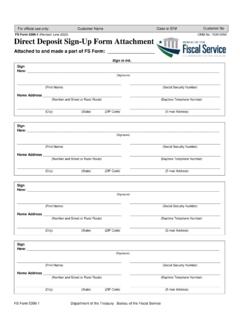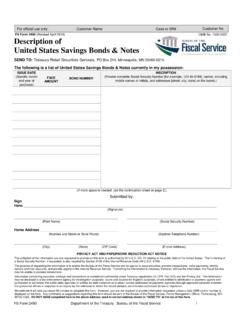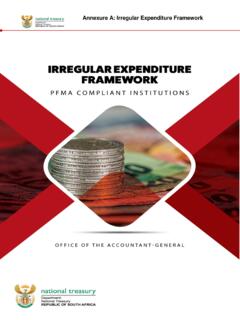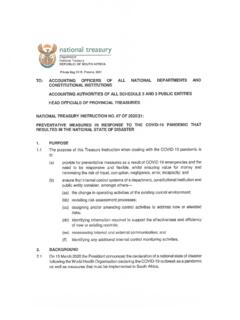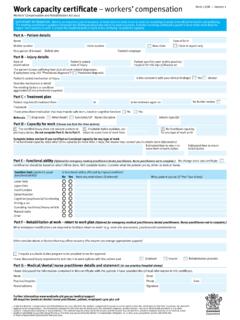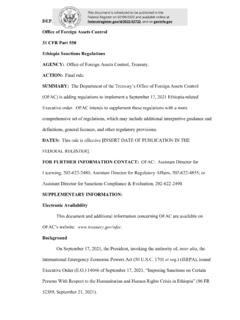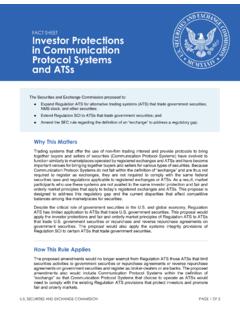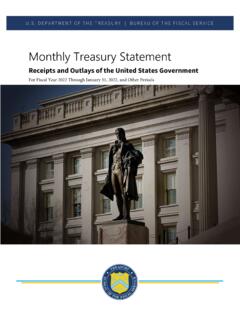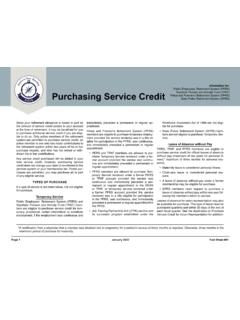Transcription of INTERACTION BETWEEN GOVERNMENT MANAGERS AND …
1 INTERACTION BETWEEN GOVERNMENT MANAGERS AND CONTRACTOR EMPLOYEES This paper contains guidance on agency interactions with employees of contractors performing non-personal services for the agency. Topics covered include Distinctions BETWEEN personal and non-personal services contracts, and an overview of inherently governmental functions that must be performed by agency employees Permissible interactions and roles of agency MANAGERS and contractor employees performing non-personal services contracts and oversight of performance; and GOVERNMENT personnel and contractor common INTERACTION problems. If agency MANAGERS or other personnel require assistance on a particular issue, they should contact legal counsel or the assigned contracting officer for the contract involved. I. TYPES OF SERVICE CONTRACTS AND INHERENTLY GOVERNMENTAL functions A.
2 Non-personal service contracts are permitted and preferred under agency rules. Contractor personnel working under these types of contracts are not subject to the supervision and control of a GOVERNMENT manager or employee , they are not subject to controls that are usual in relationships BETWEEN the GOVERNMENT and its employees. B. "Inherently Governmental functions " can only be performed by federal employees or officials. These are functions so intimately related to the public interest as to require performance by GOVERNMENT employees-- they cannot be contracted out or performed by other than agency employees. Some of these functions are-- Binding the United States to take or not to take some action by contract, policy, regulation, authorization, order, or otherwise; Commissioning, appointing, directing, or controlling/supervising officers or employees of the United States; or Exerting ultimate control over the acquisition, use, or disposition of the property, real or personal, tangible or intangible, of the United States, including the collection, control, or disbursement of appropriated and other Federal funds.
3 Inherently governmental functions normally do not include gathering information for or providing advice, opinions, recommendations, or ideas to GOVERNMENT officials. Contractors may perform these functions . C. Personal services contracts generally are prohibited. The Federal GOVERNMENT obtains its employees by direct hire under competitive appointment or other procedures required by the civil service laws. If a non-personal services contract is involved, an attempt by an agency manager to control the details of 2 contractor performance or to exert control over contractor personnel may violate the civil service laws, among other things. This agency (DHS) possesses authority to enter into personal services contracts, but they must be authorized as part of the contract in question under agency procedures. Below is a chart listing common characteristics of personal services contracts.
4 If you are utilizing contract personnel as listed in the chart, and the contract language does not provide that the contractor is to provide personal services, you should cease utilizing contractor personnel in the ways listed unless you get the contract modified to allow personal services. EMPLOYER-EMPLOYEE INDICATORS FOR PERSONAL SERVICES CONTRACTS Performance on GOVERNMENT site Tools and equipment furnished by Govt. Services applied directly in furtherance of assigned function or mission. Comparable services performed using civil service personnel Need for the type of service expected to last beyond 1 year Inherent nature of the service, or the manner in which it is provided, reasonably requires GOVERNMENT direction or supervision of contractor employees II AGENCY interactions WITH NON-PERSONAL SERVICES CONTRACTORS IF NON-PERSONAL SERVICES CONTRACT, GOVERNMENT MAY NOT-- Supervise contract employees Assist contractor employees in doing their jobs Direct contractor employees to report to GOVERNMENT officials Assign GOVERNMENT personnel to work under or report to a contractor employee Maintain working and leave schedules for contractor employees Hire, fire, discipline, or evaluate individual contractor employees Approve leave for contractor employees Note: The above list is not all-inclusive.
5 III. ALLOWED AND PROHIBITED ROLES OF NON-PERSONAL SERVICES CONTRACTORS CONTRACTORS MAY PROVIDE SERVICES THAT RELATE TO Budget preparation Policy analyses, studies, and options Reorganization and planning Support of acquisition planning Development of regulations Contract management assistance 3 Evaluation of other contractor s performance Technical evaluation of proposals Support in preparing FOIA request responses Information regarding policies or regulations Inspection services Development of statements of work Note: The above list is not all-inclusive. CAVEAT: The above services may be rendered only when provided for in the particular contract, , the services must be within the scope of work of the particular contract. See FAR for more expansive list. FEDERAL CONTRACTORS GENERALLY MAY NOT --- Determine agency policy Determine agency program priorities for budget requests Direct or control agency employees Control Federal treasury accounts Approve position descriptions and performance standards for Federal employees Determine budget policy, guidance, and strategy Draft Congressional testimony, responses to Congressional correspondence, or agency responses to audit reports from the Inspector General, the General Accounting Office, or other Federal audit entity.
6 Select or non-select individuals for Federal employment or interview candidates. Note: The above list is not all-inclusive. IN FEDERAL PROCUREMENTS, CONTRACTORS MAY NOT Determine what is to be acquired by the GOVERNMENT Award contracts, approve any contractual documents, or administer contracts (including ordering changes in contract performance or contract quantities) Participate as voting members on any source selection boards Terminate contracts Determine whether contract costs are reasonable, allocable, and allowable Participate as a voting member on performance evaluation boards Note: The above list is not all-inclusive. 4 IV. SPECIFIC AREAS OF CONCERN 1. Scope of Duties under Contract 2. Travel and per diem of contractor personnel 3. Speaking at Conferences and Gatherings 4. Proprietary Information 5.
7 Use of GOVERNMENT Property and Vehicles 6. Awards 7. Gifts 1. Scope of Duties under Contract Each non-personal services contract outlines the services that are to be performed by the contractor and its employees. Agency MANAGERS may not allow or request the rendition of services that are not within the scope of the particular contract. If the desired services fall outside the scope of the contract, the agency program manager must contact the contracting officer (CO) or the CO s Technical Representative to ascertain whether or not the contract may be modified to include the services needed. Only the agency s contracting officer may modify the contract. 2. Travel and Per Diem Contractor travel and reimbursement for travel costs are governed by the terms of the particular contract under which services are performed by the contractor and its employees.
8 If a contract does not authorize reimbursement for travel costs, the contractor cannot be requested to travel by agency program officials or reimburse the contractor if it does so. Only the contracting officer may modify a contract to provide for travel reimbursement if not already included in a contract. Contractor travel is not to be authorized using agency forms nor should payment to contractors or their employees be based on submission of agency travel vouchers. 3. Speaking at Conferences While contractor employees may attend conferences or meetings on the agency s behalf, the contractor may not represent or discuss policy positions that may or may not be taken by the agency. The contractor may disseminate information concerning existing agency policies or rules, and outline the rules, but may not take a position in the forum respecting what the agency should or should not do, commit the agency to a policy position, or offer a view on an issue that is under agency policy review.
9 Agency policy-making is an inherently governmental function. If having a contractor speak or attend a conference on behalf of the agency creates the strong possibility that the contractor will be asked to interpret agency policy, the federal manager should strongly be discouraged from having the contractor, rather than a GOVERNMENT employee attend the conference or speak for the agency at the function in question. In addition, contractors should not represent themselves or create the appearance of status as an employee or official of the agency, especially if they are appearing before the public or non-federal entities that regularly deal with the agency. They should identify themselves as contract employees performing services for the agency under contract. If they are not 5 performing services under the contract at the time of their appearance, they should also disclaim any affiliation with the agency for the purpose of the conference or meeting.
10 4. Proprietary or Sensitive Information If the contractor or its employees come into possession of proprietary or other information during the course of performing its contract with the agency, they must abide by any restrictions imposed by the contract and federal law and regulation on dissemination or use of the information or data. Contractor working areas should be separated from GOVERNMENT employees whenever possible to avoid misuse of proprietary information. Contractor work areas should be clearly labeled as contractor areas, and they should be identified clearly in agency directories, identification badges, email addresses as contractors. 5. Use of GOVERNMENT Property and Vehicles Unless otherwise provided in the contract, contractors are responsible for providing the equipment or personnel needed to perform the services outlined in the contract.
